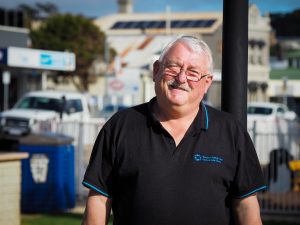Preventing suicide within Tasmania’s apprentice community

TasBGAS’ Mark Fishwick works with OzHelp Tasmania to look after the young apprentices in his care.
Mark Fishwick was relaxing at home one Saturday night when his phone unexpectedly rang. It was one of the Tasmanian Building Group Apprenticeship Scheme (TasBGAS) field officer’s apprentices, and he wasn’t in a good place.
“It was strange of him to call at that time, and I worked out that he was considering self harm,” he remembers.
Mark, who has spent the last 20 years managing apprenticeships in Tasmania, was able to use some of his own training to de-escalate the young man’s distress.
These days, he says the two regularly reflect on how close the apprentice came to ending his life.
“We talk about how if somebody hadn’t been around at that time to respond to him, what would’ve happened?” he says.
Unfortunately, that’s an outcome Mark has also experienced before.
He’s lost three apprentices to suicide in his lifetime – but, thankfully, none since TasBGAS started working with OzHelp Tasmania to deliver training and support to the young workers in their care.
The Tasmanian not-for-profit was established in response to a number of suicides by young apprentices in the building and construction industry and now works to deliver evidence-based suicide prevention, physical and mental health workplace training and support programs.
In Tasmania, Primary Health Tasmania has commissioned OzHelp Tasmania to provide suicide prevention training as well as support and referral pathways for workers affected by suicide or mental health issues.
OzHelp is also contributing to the work of Tasmanian Suicide Prevention Trial communities which are seeking to build a better safety net for people vulnerable to suicide.
While OzHelp Tasmania’s origins are linked to the construction industry, all Tasmanian workplaces are eligible for these statewide commissioned services.
TasBGAS chief executive David Fagan says the young apprentices gain an enriched understanding of how to seek and offer help from the training.
“They also get more of an idea of the bigger picture of life through the examples that are shared and the situations that are discussed,” he says.
For Mark, enlisting OzHelp Tasmania to deliver the training during the apprentices’ first and second years helps to put the right pathways in place for the young workers if they need to seek help down the track.
“We intentionally don’t sit in on the training sessions – they know we’re there to help, but we also want to create an opportunity for them to open up if they want to talk to someone outside the organisation,” he says.
“The apprentices always say how good the sessions were after they’ve had them, because they now know who to go to if they’re under any pressure, or if it’s about one of their mates.”
Encouragingly, Mark says the younger generation seems to grasp the importance of the training, and why they need to do it.
“In the past we’ve fought so hard to get someone to see they have an issue,” he says.
“But the younger people now do seem to accept going to these courses, and we don’t get any pushback.”
He also has high praise for OzHelp Tasmania’s workplace support coordindator, David Nancarrow, who says the training sessions provide a great opportunity to get on the apprentices’ radar as more than a “nameless face”.
“Apprentices are more likely to engage with OzHelp Tasmania trainers after they have attended a workshop because when they meet us, they are building a relationship,” he explains.
“Relationship building is a crucial aspect of saving an apprentice’s life – a good relationship creates a safe, supportive place in which they can talk and open up about their life.”
David says personal relationships can be a major risk factor for the young workers, typically men, as well as the burgeoning responsibilities of having a wage and adult lifestyle.
These days, the experienced counsellor and mediator says he spends a lot of time keeping up with his young clients over his mobile phone – a method he says allows him to drop everything when a high-risk circumstance presents itself.
“The apprentices can call me at any time. It’s not a nine to five job,” he says.
“If I get a call, even today, I’ve got to make contact today with that boy. It’s absolutely immediate – it has to be.”
When an in-person chat is necessary, David says he tries to be creative about finding safe, appropriate places where apprentices can get the help they need.
“My car is my office, so I’ll meet them after hours at Maccas or Hungry Jack’s,” he says.
“Sometimes it’s down at a park bench at Penguin. We’re always trying to find a place to see them, because one size doesn’t fit all.”
David sees his role as being able to keep at-risk apprentices safe within the realms of his training and, when applicable, refer them on to medical professionals.
“I always say, the best port of call if someone is suicidal is their local or family doctor,” he says.
It’s a complex job – one that brings together elements of mentoring, counselling, triaging and case management.
But for David, the guiding principle is simple.
“Our number one goal is to keep them alive.”
